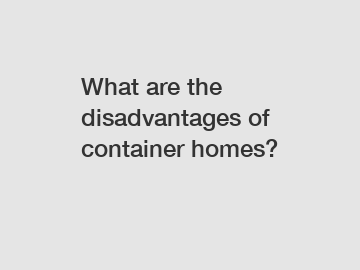What are the disadvantages of container homes?
Container homes have gained popularity in recent years for their affordability, durability, and eco-friendly construction. However, like any other type of housing, there are also disadvantages to consider when opting for a container home. In this article, we will explore some of the drawbacks of container homes to help you make an informed decision.
One of the main disadvantages of container homes is the limited space they offer. Shipping containers come in standard sizes, which can restrict the layout and design options for your home. This can be especially challenging if you have a large family or need extra space for storage or work purposes. While it is possible to combine multiple containers to create a larger living space, this can significantly increase the cost of construction.
Another drawback of container homes is the potential for insulation and ventilation issues. Shipping containers are made of steel, which can easily conduct heat and cold. This can result in poor insulation and high energy bills, as you may need to rely heavily on heating and cooling systems to maintain a comfortable temperature inside the home. Additionally, without proper ventilation, moisture buildup can occur, leading to mold and mildew growth. Proper insulation and ventilation solutions can help mitigate these issues, but they can add to the overall cost of the project.

Furthermore, container homes may face zoning and building code challenges. While some areas have embraced container homes as a sustainable housing option, others may have restrictions or regulations that make it difficult to build or live in a container home. It is important to research local building codes and obtain any necessary permits before embarking on a container home project to avoid legal issues and potential fines.
Maintenance is another consideration when it comes to container homes. While steel is a durable material, it is susceptible to rust and corrosion over time, especially in areas with high humidity or salt exposure. Regular maintenance and treatment are necessary to prevent deterioration and ensure the longevity of the structure. Additionally, modifications or repairs to the container may require specialized tools and expertise, which can be costly and time-consuming.
One of the more subjective disadvantages of container homes is the aesthetic appeal. While some people appreciate the industrial and modern look of container homes, others may find them unappealing or out of place in residential neighborhoods. The uniformity of shipping containers can also make it challenging to personalize the exterior or integrate the home seamlessly into its surroundings. However, with creativity and thoughtful design choices, it is possible to enhance the appearance of a container home and make it a unique and welcoming space.
Finally, one of the biggest disadvantages of container homes is the upfront cost. While containers themselves are relatively inexpensive compared to traditional building materials, the overall cost of construction can add up quickly. Factors such as site preparation, insulation, plumbing, electrical wiring, and interior finishes can significantly increase the total cost of a container home project. It is essential to create a detailed budget and plan carefully to avoid overspending and unexpected expenses.
In conclusion, container homes offer a range of benefits, but they also come with their own set of disadvantages to consider. Limited space, insulation and ventilation challenges, zoning and building code issues, maintenance requirements, aesthetic concerns, and upfront costs are all factors to take into account when thinking about building a container home. By weighing the pros and cons carefully and planning thoughtfully, you can make an informed decision about whether a container home is the right choice for you. Remember that every housing option has its trade-offs, and it is essential to prioritize what is most important to you and your lifestyle.
For more 20ft Expandable House, 30ft Expandable Container House, 30ft Expandable Houseinformation, please contact us. We will provide professional answers.

Comments